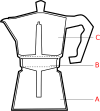Speaker
Dr
Camilo Garcia Cely
(DESY)
Description
Ordinary matter is in the form of bound states. The simple example is hydrogen, which is a bound state of one proton and one electron. Another example is the proton itself, which is a bound state of the elementary particles of QCD. In the light of this, it is natural to ask whether dark matter is made of bound states or if it is an elementary particle that can form them.
This talk is devoted to the first possibility, that is, I will assume that dark matter itself is a bound state and I will discuss the phenomenological consequences associated to its finite size.
Author
Dr
Camilo Garcia Cely
(DESY)
